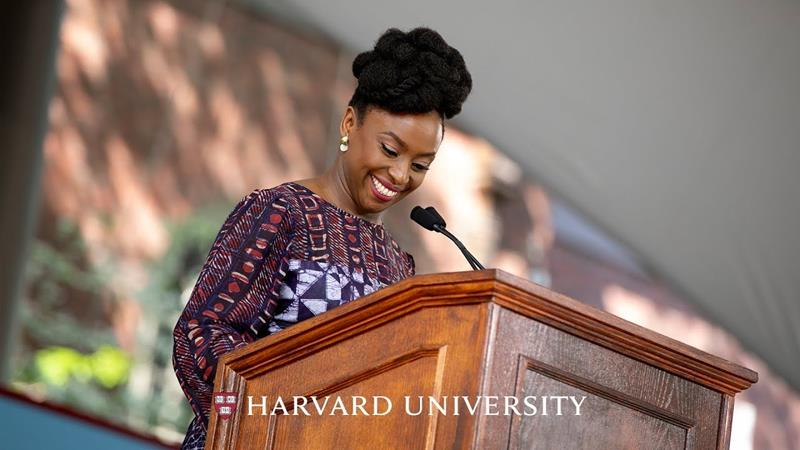Stephen Ukandu, Umuahia
The open letter by Africa’s award-winning novelist, Chimamanda Ngozi Adichie, has rattled the camp of Nigeria’s President-Elect, Bola Ahmed Tinubu, as his aides have launched a barrage of missiles at her.
She had plainly expressed shock that the US State Department congratulated the purported winner of the February 25 presidential poll that could only pass for “a charade.”
In a swift response, Director of Publicity Tinubu/Shettima Campaign, Bayo Onanuga urged President Joe Biden to trash Adichie’s letter.
Similarly, the official Spokesperson of the ruling All Progressives Congress, APC, 2023 Presidential Campaign Council, APC PCC, and Senior Advocate of Nigeria, Festus Keyamo, hit back at Adichie , saying that she was suffering from colonial mentality.
Keyamo who made mockery of the African celebrated writer, urged Biden not to take her letter seriously, accusing her of being a fan of a sore election loser.
Below is part of what Adichie wrote in her heroic open letter hailed by many as a true reflection of the minds of many Nigerian youths:
“American intelligence surely cannot be so inept. A little homework and they would know what is manifestly obvious to me and so many others: The process was imperiled not by technical shortcomings but by deliberate manipulation.
“I hope, President Biden, that you do not personally share this cordial condescension. You have spoken of the importance of a “global community for democracy,” and the need to stand up for “justice and the rule of law.” A global community for democracy cannot thrive in the face of apathy from its most powerful member,” she added.
“Why would the United States, which prioritizes the rule of law, endorse a president-elect who has emerged from an unlawful process?
“This Nigerian election was supposed to be different, and the U.S. response cannot—must not—be business as usual.
“Congratulating its outcome, President Biden tarnishes America’s self-proclaimed commitment to democracy. Please do not give the sheen of legitimacy to an illegitimate process. The United States should be what it says it is.”
“Since the end of military rule in 1999, Nigerians have had little confidence in elections. To vote in a presidential election was to brace yourself for the inevitable aftermath: fraud!
“Elections would be rigged because elections were always rigged; the question was how badly. Sometimes voting felt like an inconsequential gesture as predetermined “winners” were announced.
“A law passed last year, the 2022 Electoral Act, changed everything. It gave legal backing to the electronic accreditation of voters and the electronic transmission of results, in a process determined by the Independent National Electoral Commission (INEC).
“The chair of the commission, Professor Mahmood Yakubu, assured Nigerians that votes would be counted in the presence of voters and recorded in a result sheet and that a photo of the signed sheet would immediately be uploaded to a secure server.
“When rumours circulated about the commission not keeping its word, Yakubu firmly rebutted them. In a speech at Chatham House in London (a favourite influence-burnishing haunt of Nigerian politicians), he reiterated that the public would be able to view “polling-unit results as soon as they are finalized on election day”.
“Nigerians applauded him. If results were uploaded right after voting was concluded, then the ruling party, the All Progressives Congress (APC), which has been in power since 2015, would have no opportunity for manipulation. Technology would redeem Nigerian democracy. Results would no longer feature more votes than voters.
“Nigerians would no longer have their leaders chosen for them. Elections would, finally, capture the true voice of the people. And so trust and hope were born.
“By the evening of February 25, 2023, that trust had dissipated. Election workers had arrived hours late, or without basic election materials.
“There were reports of violence, of a shooting at a polling unit, and of political operatives stealing or destroying ballot boxes. Some law-enforcement officers seemed to have colluded in voter intimidation; in Lagos, a policeman stood idly by as an APC spokesperson threatened members of a particular ethnic group who he believed would vote for the opposition.”
The award -winning author accused the INEC Chairman, Professor Mahmood Yakubu, of breaking the rules of the electoral umpire by hastily announcing a winner without investigating reports of irregularities recorded during the presidential election.
She said the elections were not only rigged but also insulted the intelligence of Nigerians as there was no legal action to issues of manifest manipulations reported.
“Most egregious of all, the electoral commission reneged on its assurance to Nigerians. The presidential results were not uploaded in real-time.
“Voters, understandably suspicious, reacted; videos from polling stations show voters shouting that results be uploaded right away. Many took cellphone photos of the result sheets. Curiously, many polling units were able to upload the results of the house and senate elections, but not the presidential election,” she said.
“No one was surprised when, by the morning of the 26th, social media became flooded with evidence of irregularities. Result sheets were now slowly being uploaded on the INEC portal, and could be viewed by the public. Voters compared their cellphone photos with the uploaded photos and saw alterations: numbers crossed out and rewritten; some originally written in black ink had been rewritten in blue, some blunderingly whited-out with Tipp-Ex. The election had been not only rigged but done in such a shoddy, shabby manner that it insulted the intelligence of Nigerians.”
“As vote counting began at INEC, representatives of different political parties—except for the APC—protested. The results being counted, they said, did not reflect what they had documented at the polling units. There were too many discrepancies,” she added.
“It seemed truly perplexing that, in the context of a closely contested election in a low-trust society, the electoral commission would ignore so many glaring red flags in its rush to announce a winner. (It had the power to pause vote counting, to investigate irregularities—as it would do in the governorship elections two weeks later.)

